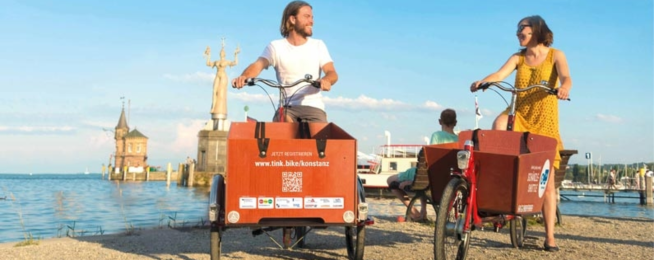Germany’s major e-cargo bikeshare trial—known as TINK—has been so successful that it has it has been made permanent and is now expanding across the country.
A sustainable cities initiative, TINK began as a 2-year, closely evaluated trial in Konstanz.
Over that period each TINK bike was used for an average of 2 hours and 47 minutes per day.
There was a total of 20,340 rental transactions and 52,740 user hours.
The overwhelming response has now led to it becoming an integral part of the city's cycle hire scheme.
Next TINK was established in Norderstedt, where the city has now purchased 15 electric cargo bikes, which can be rented by citizens and visitors via the established Nextbike rental bike system.
The bikes complement the existing Nextbike offers of normal bikes and cargo bikes without electric assist,
The new two-wheeled electric cargo bikes carry a load of up to 80 kilograms in their transport box with assist to a maximum 25 kilometres per hour.
The bikes can also carry two children up to the age of seven. Bikes can be borrowed and returned at any of the existing rental bike stations in Norderstedt via the Nextbike app or the Nextbike hotline.
In order to create a special incentive, the first half hour of use per day is free of charge for registered customers.
After that, each additional half hour costs one euro, with a maximum of nine euros per day. This means that the electric transport wheels are available at the same rate as the unassisted share bikes and cargo bikes.
The basic idea is to make cargo bicycles available to the population at large and provide incentives for using the car less frequently even when you have to carry loads or – ideally – replacing the car by a bicycle.
The initiative makes it possible to use cargo bicycles also for persons who need them only occasionally for shopping groceries on the weekend.
After the first months the project seems to have made a successful start with the number of users and the number of hires exceeding expectations.
The Germans believe cargo bikes have an enormous potential to replace motorized transport, and they can help to reduce air pollution and noise emissions as well making better use of limited space in congested urban environments.
What is more, they provide private and commercial users with the opportunity to do without their own passenger car or reduce the size of their vehicle fleet and, in doing so, save money.
Two thirds of the journeys in the logistics sector that could be shifted to the bike are made as private car trips.
In one survey, 6000 purchases at supermarkets and hardware stores were analysed and it was found that 80% of all purchases could have been carried by bicycle, and another 14% using an additional trailer or a cargo bicycle.
Only for 6% would a passenger car have been required.
Research is showing that many car owners rarely use their vehicles, but keep them for those occasions when they need to carry larger objects.
But when free, or subsidised e-cargo bikes are available, these same people realise that their car is no longer essential.
Become our friend
Find out more about Bicycle Network and support us in making it easier for people to ride bikes.


